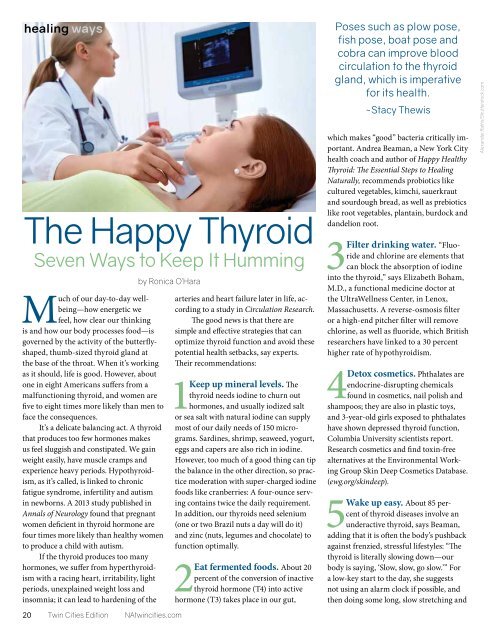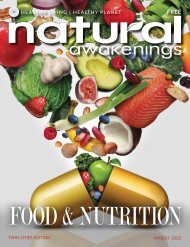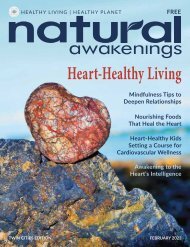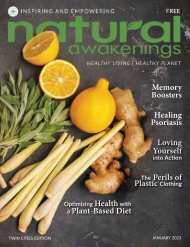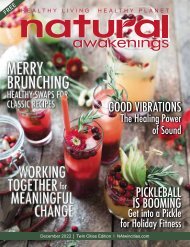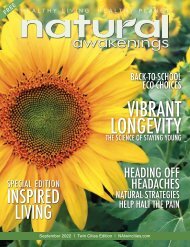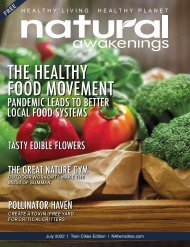Natural Awakenings Twin Cities November 2019
Natural Awakenings Twin Cities magazine is your source for healthy living, healthy planet information. Have you visited our website lately? Sign up for our Newsletter and Digital Magazine, read archived articles from local experts, and keep up with local healthy living events. Visit NATwinCities.com today. We provide a complete toolkit for businesses. List your healthy or green business for free. Enter your calendar events for free.
Natural Awakenings Twin Cities magazine is your source for healthy living, healthy planet information. Have you visited our website lately? Sign up for our Newsletter and Digital Magazine, read archived articles from local experts, and keep up with local healthy living events. Visit NATwinCities.com today.
We provide a complete toolkit for businesses. List your healthy or green business for free. Enter your calendar events for free.
Create successful ePaper yourself
Turn your PDF publications into a flip-book with our unique Google optimized e-Paper software.
healing ways<br />
The Happy Thyroid<br />
Seven Ways to Keep It Humming<br />
Much of our day-to-day wellbeing—how<br />
energetic we<br />
feel, how clear our thinking<br />
is and how our body processes food—is<br />
governed by the activity of the butterflyshaped,<br />
thumb-sized thyroid gland at<br />
the base of the throat. When it’s working<br />
as it should, life is good. However, about<br />
one in eight Americans suffers from a<br />
malfunctioning thyroid, and women are<br />
five to eight times more likely than men to<br />
face the consequences.<br />
It’s a delicate balancing act. A thyroid<br />
that produces too few hormones makes<br />
us feel sluggish and constipated. We gain<br />
weight easily, have muscle cramps and<br />
experience heavy periods. Hypothyroidism,<br />
as it’s called, is linked to chronic<br />
fatigue syndrome, infertility and autism<br />
in newborns. A 2013 study published in<br />
Annals of Neurology found that pregnant<br />
women deficient in thyroid hormone are<br />
four times more likely than healthy women<br />
to produce a child with autism.<br />
If the thyroid produces too many<br />
hormones, we suffer from hyperthyroidism<br />
with a racing heart, irritability, light<br />
periods, unexplained weight loss and<br />
insomnia; it can lead to hardening of the<br />
by Ronica O’Hara<br />
arteries and heart failure later in life, according<br />
to a study in Circulation Research.<br />
The good news is that there are<br />
simple and effective strategies that can<br />
optimize thyroid function and avoid these<br />
potential health setbacks, say experts.<br />
Their recommendations:<br />
1<br />
Keep up mineral levels. The<br />
thyroid needs iodine to churn out<br />
hormones, and usually iodized salt<br />
or sea salt with natural iodine can supply<br />
most of our daily needs of 150 micrograms.<br />
Sardines, shrimp, seaweed, yogurt,<br />
eggs and capers are also rich in iodine.<br />
However, too much of a good thing can tip<br />
the balance in the other direction, so practice<br />
moderation with super-charged iodine<br />
foods like cranberries: A four-ounce serving<br />
contains twice the daily requirement.<br />
In addition, our thyroids need selenium<br />
(one or two Brazil nuts a day will do it)<br />
and zinc (nuts, legumes and chocolate) to<br />
function optimally.<br />
2<br />
Eat fermented foods. About 20<br />
percent of the conversion of inactive<br />
thyroid hormone (T4) into active<br />
hormone (T3) takes place in our gut,<br />
Poses such as plow pose,<br />
fish pose, boat pose and<br />
cobra can improve blood<br />
circulation to the thyroid<br />
gland, which is imperative<br />
for its health.<br />
~Stacy Thewis<br />
which makes “good” bacteria critically important.<br />
Andrea Beaman, a New York City<br />
health coach and author of Happy Healthy<br />
Thyroid: The Essential Steps to Healing<br />
<strong>Natural</strong>ly, recommends probiotics like<br />
cultured vegetables, kimchi, sauerkraut<br />
and sourdough bread, as well as prebiotics<br />
like root vegetables, plantain, burdock and<br />
dandelion root.<br />
3<br />
Filter<br />
drinking water. “Fluoride<br />
and chlorine are elements that<br />
can block the absorption of iodine<br />
into the thyroid,” says Elizabeth Boham,<br />
M.D., a functional medicine doctor at<br />
the UltraWellness Center, in Lenox,<br />
Massachusetts. A reverse-osmosis filter<br />
or a high-end pitcher filter will remove<br />
chlorine, as well as fluoride, which British<br />
researchers have linked to a 30 percent<br />
higher rate of hypothyroidism.<br />
4<br />
Detox cosmetics. Phthalates are<br />
endocrine-disrupting chemicals<br />
found in cosmetics, nail polish and<br />
shampoos; they are also in plastic toys,<br />
and 3-year-old girls exposed to phthalates<br />
have shown depressed thyroid function,<br />
Columbia University scientists report.<br />
Research cosmetics and find toxin-free<br />
alternatives at the Environmental Working<br />
Group Skin Deep Cosmetics Database.<br />
(ewg.org/skindeep).<br />
5<br />
Wake up easy. About 85 percent<br />
of thyroid diseases involve an<br />
underactive thyroid, says Beaman,<br />
adding that it is often the body’s pushback<br />
against frenzied, stressful lifestyles: “The<br />
thyroid is literally slowing down—our<br />
body is saying, ‘Slow, slow, go slow.’” For<br />
a low-key start to the day, she suggests<br />
not using an alarm clock if possible, and<br />
then doing some long, slow stretching and<br />
Alexander Raths/Shutterstock.com<br />
20 <strong>Twin</strong> <strong>Cities</strong> Edition NAtwincities.com


